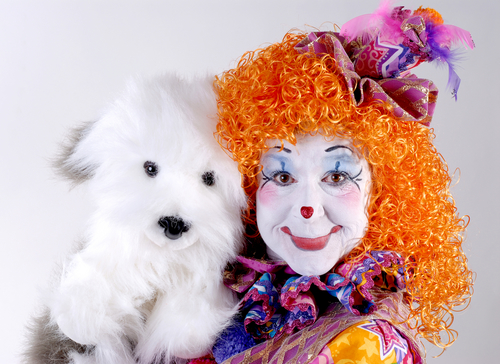Clowning from the heart; this phrase surfaces in every clown publication and at every convention. It seems to me that some instructors use this phrase to win over their audience or give credibility to what they do. They may be talking about prop building or elephant riding or any number of relevant clown things, but the moment they use the phrase that they clown from the heart, it’s like a spell has been cast. Those in attendance have a new deep appreciation for the speaker. He used the magic words, clowning from the heart, though it may not have had anything to do with the topic at hand. I believe that clowning from the heart needs to be more than a catch phrase. I posed the question What does ‘clowning from the heart’ mean to you? to former WCA President Janet Tucker, Clown Hall of Fame Inductee Arthur Pedlar, Bruce Charlie Johnson and a number of other quality clowns. This article shares a number of insights from these performers.
Clowning from the heart usually is associated with warm fuzzy feelings, patting preschoolers on the head, and singing “I love you, you love me…” Clowning from the heart is often associated with one on one clowning presented in senior care centers and hospitals. It is often linked to small groups, because people usually only share their hearts in a small group setting. Large groups are intimidating. Clowning from the heart is tied to personal sharing. Though I believe this all may be true, it also may be more than that.
Great entertainers give you the sense, even while sitting in a crowd of a thousand, that they care about you. Through their performance you and they form a bond; a relationship. Consider the late Red Skelton. He loved his audiences. You could feel what was in his heart, though it was a large group. (Janet) Simply put, clowning from the heart implies clowning from the motive of love and joy …. Clowning from the heart uses positive humor techniques and comedy that is innocent fun, inclusive and healing.
Bruce shares: Others clown from the mind. They intellectualize why they clown. They think they want to be clowns, and learn what they can, but don’t involve their emotions in their performance. These are the ones who perform routines exactly the way they were taught. They do things the way they have memorized them. They don’t always seem to be enjoying what they are doing. They don’t connect with their audience emotionally.
When you say somebody clowns from the heart, their emotions are part of their clowning. They are motivated by love. It might be love for the art of clowning, love for their audience, or love for their God. Their performances are characterized by a sense of joy and respect. (Respect for their audience, yourself, other entertainers and for the art of clowning. – Steve Smith
One may only give from the heart, what one has already received into his own heart. That’s why often clowning from the heart is a phrase used in clown ministry settings. Once one senses they have received something heart-touching he desires to share that with others. Many have sensed a touch of love, joy, peace, etc., in their hearts. They desire to give out some of what they have received.
The Rock Clown Alley in Rockford, Illinois hosts a clown conference called, Clowning From the Heart. Some of their organizers responded to the question.
Patti Crofton shares, When I think of clowning from the heart I think of ‘feeling, emotion, sincerity, real, compassion, professional. Since we are clowning from the heart and for the King we need to portray all the above things and more. We must go the extra mile because our main purpose is to further the Kingdom (of God).
Rich and Ginny Paul state, As ‘Christian’ clowns we have the obligation to speak and show the love of Christ through our clowning. A clown can bring happiness where there may be sadness, smiles where there may be frowns and love where there may be hate. God can use each of us uniquely to share His Word.
Bruce states: When those times come when I don’t feel like clowning, I pray, Lord, I don’t feel like clowning right now. I know you love these people. Use me as a conduit for your love. Often those are the most successful shows I perform.
To these clowns, and many others who have a personal experience with God, clowning from the heart means expressing the love of God to the world around them.
(Janet) While…(this) has become a catch phrase for people doing ministry or gospel clowning, it should not be strictly Christian related. The positive aspects of humor performed by the clown with a correct attitude and direction of purpose can bring love, laughter, joy and healing to all those enjoying that clown’s performance. Proverbs 17:22 says ‘A merry heart doeth good like a medicine’ and merry heart clowning is good for the clown and for all those the clown comes in contact with.
Janet also mentions that this concept of clowning from the heart, is usually interpreted as a positive thing, but it also may be negative. Jesus states in Matthew 15, Not what goes into the mouth, but what comes out of the mouth defiles the man (vs. 11) because …those things which proceed out of the mouth come forth from the heart and they defile the man (vs. 18). Then he says, For out of the heart proceed evil thoughts, murders, adulteries,… these are the things which defile a man. (vs. 19, 20). Also, Mark 12:35 A good man out of the good treasure of the heart brings forth good things; and an evil man out of the evil treasure brings forth evil things.
If this is true, then everyone who communicates is actually doing it from the heart. The heart is the source from which our speech and our expression flows. Matthew 12:34 states, Out of the overflow of the heart the mouth speaks. So, to clown from the heart, is probably not an isolated case, but is something that is happening as each one puts on the wardrobe and engages an audience. What is portrayed is representative of what one values and what one has in his heart. This may be wholesome, or this may be offensive. Irreverent shock-humor may be clowning from the heart, for some. It depends on what the person’s heart contains.
Another caution: If misunderstood, it may become an excuse for laziness and lack of preparation. Some justify a lack of professionalism because I clown from the heart, not to be an expert. World renowned clown artist, Arthur Pedlar states, Clowning from the heart, trips off the tongue so readily these days that I fear it is often used as an excuse not to practice a skill and/or thoroughly rehearse a routine. (i.e., I don’t need to do any of that…you see I ‘clown from the heart.’ ) Which leads to a self-satisfied smugness. That is putting it at its worst! Arthur notes some poor experiences he’s had with clown ministry people who did not prepare, nor present, well. He cautions that this approach is amateurish and not worthy of the sanctuary. We must not allow our freedom in clowning to become license for ineptness.
Clowning from the heart, if it truly means clowning with a correct attitude and direction of purpose bringing love, laughter, joy and healing, mandates that the clown give his best to his audience. Love gives it’s best. Clowning from the heart should never be an excuse for amateurism, but a driving force propelling one towards excellence.
Bruce: Somebody who clowns from the heart treats their audience with the respect that is the result of their love. They work to make sure they give every audience the best show they are capable of at the moment. They continue working to improve their future performances.
Clowning from the heart, is different than clowning from the pocketbook. Clowning from the heart, means coming at clowning from a base of love, rather than from the standpoint of just comedy or from the desire to make money. There’s nothing wrong with making a living clowning, but in clowning from the heart, finances is not the rule by which a clown presentation is judged. Simply put, clowning from the heart implies clowning from the motive of love and joy rather than financial gain. (Janet)
If one is motivated by the love in one’s heart it will show by the inspiring, inclusive, warmhearted, innocent, life-affirming and healing humor shared with one’s audience. Somebody who clowns from the heart won’t do anything to put down an audience member. They make sure that volunteers are treated kindly while on stage. When there is a small audience, they work just as hard to make sure everyone enjoys themselves as if there was a huge audience. When an audience doesn’t seem to be responding they don’t give up on the audience, but keep adjusting to try to get through to that particular audience. (Bruce)
They are sensitive to the needs of their audience. This may be the need to be left alone, the need for laughter, the need for someone to listen, the need for a quiet moment, the need for a caring touch. Sometimes this may require the clown to break character, but the one who clowns from the heart places the needs of his audience over his own set agenda.
Bruce continues: Somebody who clowns from the heart, doesn’t always ask what is in it for me.? They do things to give back to their community. They also do things to give back to the art of clowning. They help other clowns.
As a clown you are always making decisions. What bookings should you accept? Which routines do you perform? How do you interact with each audience member? How do you respond to each new situation? What forms the basis for your decision? If they are based on love, for your art and your audience, then you are clowning from the heart.













